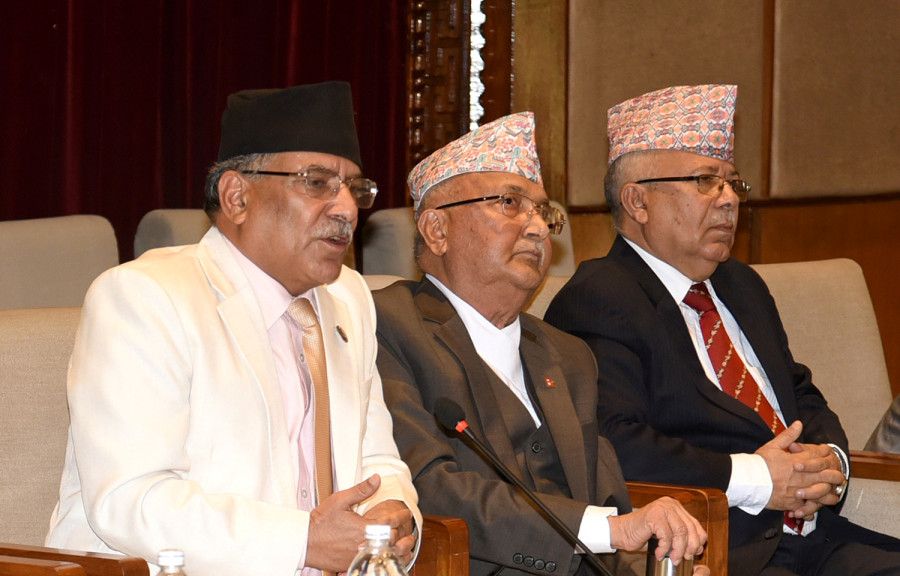Politics
Oli government’s fiascos provide opportunity for rival factions to pounce
The Madhav Nepal and Pushpa Kamal Dahal factions of the ruling party have seized the moment to criticise Oli’s handling of the Covid-19 crisis, party insiders say.
Tika R Pradhan
A series of rash actions by the government—and those closely associated with it—has not just invited criticism about the governance of Prime Minister KP Sharma Oli but also brought to light once again the cracks within the ruling Nepal Communist Party.
The recent fiasco over the procurement of medical equipment from China provided an opportunity for many of Oli’s detractors from within the party to take aim at the prime minister and his Cabinet, with leaders from the Madhav Nepal faction vehemently criticising the government and its actions.
“Madhav Nepal was expressing serious concerns over the ongoing activities of the government,” said Dilu Panta, a central committee member. “He said our party was currently going through a very difficult situation. Party leaders are unaware of how the prime minister is working.”
Due to the lockdown, party leaders have refrained from moving out from their homes but they are discussing the government’s move via telephone. “I think leaders are thinking of some moves to press the government,” Panta said.
Bishnu Rijal, a central committee member who has close relations with Madhav Kumar Nepal, has appeared vocal over the last few days and he took to social media to criticise the Oli administration on various fronts—be it the medical equipment purchase responsibility to the Army or Nepalis stuck at the border.
Defence Minister Ishwar Pokhrel, who also leads the high-level coordination committee to control Covid-19, and Health Minister Bhanubhakta Dhakal have both been pulled into a controversy over the procurement of medical equipment, the tender for which was given to a private company under suspicious circumstances. After widespread criticism, from both the party and the public, regarding the procurement process and the quality of the equipment purchased, the tender was annulled.
But the issue did not rest there. After an online news outlet, kathmandupress.com, reported on the involvement of the sons of Pokhrel and Oli’s Chief Advisor Bishnu Rimal, and the prime minister’s IT consultant Asgar Ali, the article was taken down by the website’s developers, acting on behalf of Ali, kathmandupress.com alleged.
Ramesh Bista, general-secretary of the Federation of Nepali Journalists, had issued a statement on the organisation’s behalf, condemning the action as an attack on press freedom. The statement—which was reportedly issued in consultation with Nepal Communist Party (NCP) Chair Pushpa Kamal Dahal, according to Ganesh Basnet, a journalist affiliated with the ruling party—invited a phone call from Oli’s press advisor, Surya Thapa, who allegedly “threatened” Bista.
Many party leaders believe that Dahal too has seized on the ongoing scandal to score points against his co-chair.
“Oli is under attack from all quarters of the party over the last one and a half years and that has been expedited at this time of crisis,” said Khagaraj Adhikari, a lawmaker and former minister close to Oli.
After the annulment of the original tender, the government has now authorised the Nepal Army to carry out a government-to-government procurement deal for medical supplies, another decision that has been widely criticised for the Army’s opacity in procurement matters and questions over whether procurement falls in the national defence force’s mandate.
Ruling party leaders, including Surendra Pandey, Pampha Bhusal and Mani Thapa, have publicly criticised the decision. Even Oli’s Cabinet members have taken umbrage at the decisions, alleging that they were kept in the dark. At least three ministers that the Post spoke to say that they were unaware of Oli’s decision.
“We cannot allow the Army to be involved in purchasing medical supplies,” said one of the ministers on condition of anonymity.
Kantipur, the Post’s sister paper, reported on Friday that a March 29 Cabinet meeting did not discuss the plan to hand over the responsibility of procuring medical supplies to the Army. A decision to that effect, however, was inserted in the minutes later by the chief secretary at Oli’s behest, hence even ministers were unaware of it, the paper said.
Party factions opposed to Oli have been quick to seize on the government’s mistakes, but their increasing activities also have to do with the fact that Oli has largely been absent—from both the government and the party. Since undergoing a kidney transplant on March 4, Oli has been recuperating at his official residence. He has stopped holding meetings and does not venture out, likely due to the fact that he is on immunosuppressants and is at high risk of infection.
But the unfolding scenario, with the government’s lapses in judgment, requires a party meeting, say leaders.
“There are so many issues being raised after the coronavirus pandemic that need to be discussed at a party meeting,” said Surendra Pandey, a standing committee member.
Party spokesperson Narayan Kaji Shrestha too has urged the party leadership to call a meeting of the party secretariat to discuss the government’s controversies.
“Yes, I have demanded a secretariat meeting to both the chairmen comrades. Cabinet and high-level coordination committee meetings are sitting when necessary. In today’s context secretariat can also be held following the health protocol. So I believe the meeting will be held soon, and it must,” Shrestha tweeted on Saturday.




 22.17°C Kathmandu
22.17°C Kathmandu















